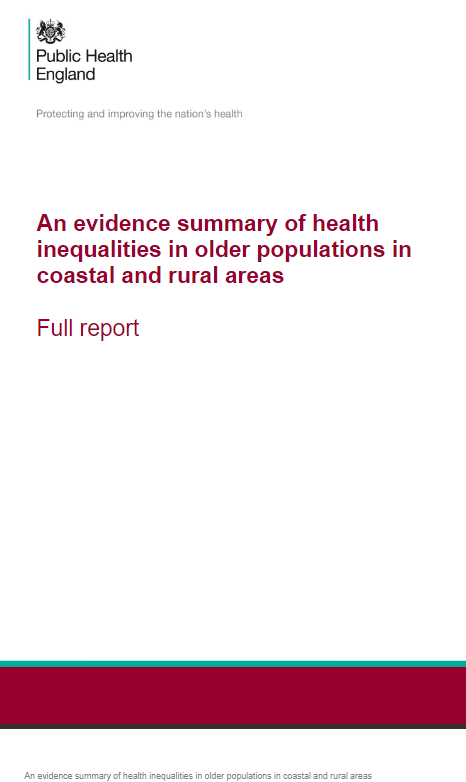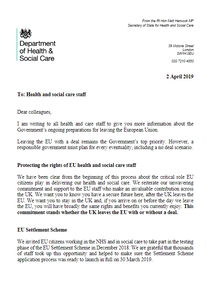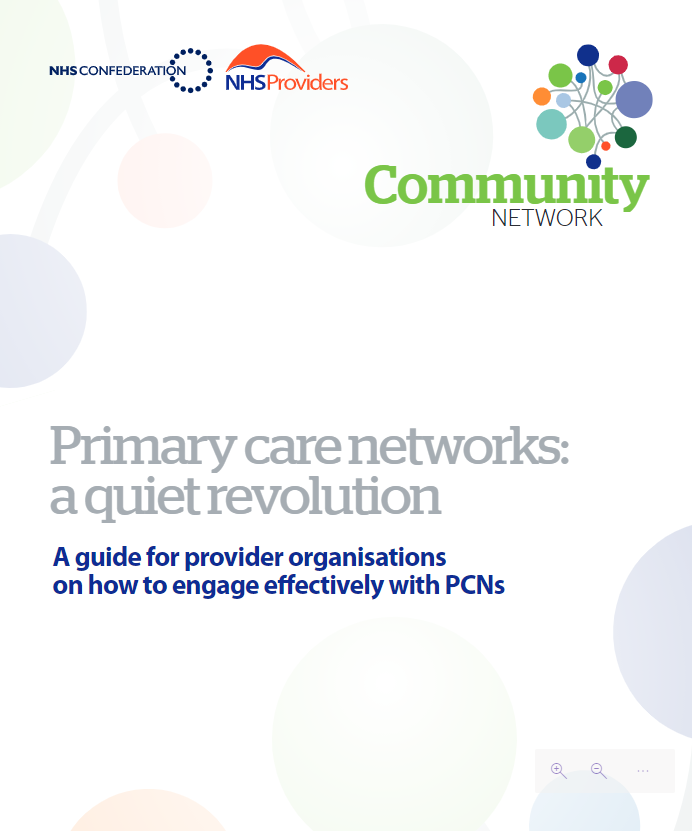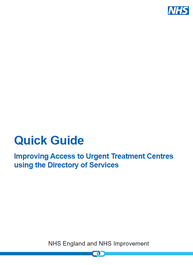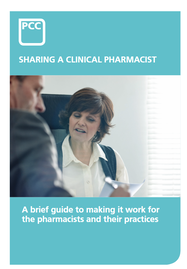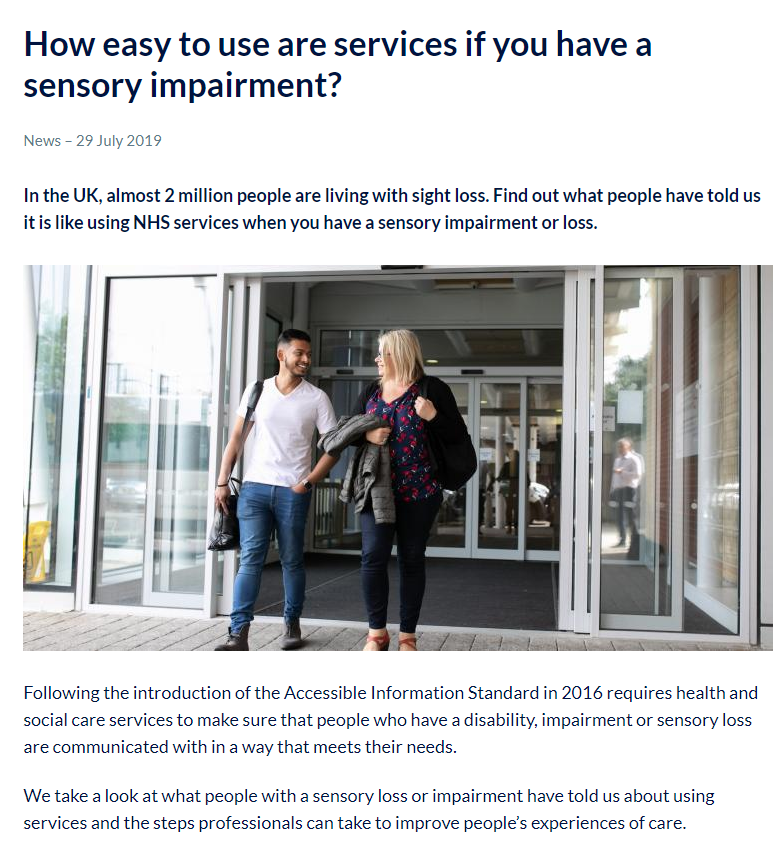NEWS - AUGUST 2019
|
HEALTH INEQUALITIES - RURAL AND COASTAL AREAS
74 pages Health inequalities persist despite numerous Policy initiatives, but achieving a lasting improvement is one of the main aims of the NHS Long Term Plan. A report from Public Health England looks at the experiences of older populations in coastal and rural areas, and provides a summary of key considerations to reduce inequalities and promote healthy ageing in these areas. It comprises a literature review and case studies with links to published research and other useful material. |
|
LETTER FROM THE RT. HON MATT HANCOCK, MP TO HEALTH AND SOCIAL CARE STAFF:
02 April 2019 - Re. Brexit preparations' update ... 3 pages
|
SUPPLIERS OF ELECTRONIC PATIENT RECORD SOLUTIONS
NHSX and NHS England have published a list of accredited suppliers of electronic patient record solutions, to give purchasers in the NHS more confidence in their route to digitisation.
NHS England and NHSX have developed a new section on the Health Systems Support Framework to help organisations and integrated care systems get best value for money when buying new digital services, software and infrastructure.
The bidders were evaluated by experts from NHS England and Improvement, NHSX, NHS Digital, Department of Health and Social Care, local care provider organisations, regional teams and national bodies,and included stakeholders such as Chief Information Officers, Chief Clinical Information Officers, Chief Nurse Information Officers, Clinical Safety Officers and front-line clinical staff.
A high quality bar, which tested the bidders against a number of functional requirements within existing deployed solutions, was set to ensure that only the most capable bidders were successful. Suppliers were permitted to offer this functionality within a sole solution or across multiple integrated solutions within a supply chain partnership.
Eight suppliers were successful –
NHSX and NHS England have published a list of accredited suppliers of electronic patient record solutions, to give purchasers in the NHS more confidence in their route to digitisation.
NHS England and NHSX have developed a new section on the Health Systems Support Framework to help organisations and integrated care systems get best value for money when buying new digital services, software and infrastructure.
The bidders were evaluated by experts from NHS England and Improvement, NHSX, NHS Digital, Department of Health and Social Care, local care provider organisations, regional teams and national bodies,and included stakeholders such as Chief Information Officers, Chief Clinical Information Officers, Chief Nurse Information Officers, Clinical Safety Officers and front-line clinical staff.
A high quality bar, which tested the bidders against a number of functional requirements within existing deployed solutions, was set to ensure that only the most capable bidders were successful. Suppliers were permitted to offer this functionality within a sole solution or across multiple integrated solutions within a supply chain partnership.
Eight suppliers were successful –
|
|
|
PRIMARY CARE NETWORKS
While there is recognition in NHS England/Improvement that PCNs are not the answer to everything, and can’t be given too much to do too quickly, it is clear that they are now expected to be the principal mechanism to achieve changes in how neighbourhood-level health and care will be delivered across the country. Once the dust settles, there will be roughly 1,260 PCNs across the country. Given that PCNs aim to manifestly impact the way that the whole population experiences local health and care delivery over the next five years, you would be forgiven for thinking this revolution has been relatively quiet to date. As the speed of change ramps up over coming months, however, it is unlikely to stay that way. |
This briefing paper sets out in 11 chapters the essential knowledge that providers should have on PCNs, including:
- Where PCNs came from.
- What PCNs are (and what they’re not).
- What outcomes PCNs will deliver.
- What has it taken to get PCNs set up.
- What role do clinical commissioning groups (CCGs) and local medical committees (LMCs) have.
- What new funding and support is available.
- What the emerging picture is.
- What the next nine months holds.
- What happens after April 2020.
- Given all of that, what role should providers play around PCNs.
- Case studies and examples of supporting offers.
NATIONAL ELECTIVE CARE TRANSFORMATION PROGRAMME
Handbooks covering all 14 specialities included in the national elective care transformation programme are now available.
Handbooks covering all 14 specialities included in the national elective care transformation programme are now available.
|
Handbooks
|
|
|
URGENT TREATMENT CENTRES, RATIONALISATION
From the outset of NHS England’s review of urgent treatment services in the NHS, patients and the public told of the confusing mix of walk-in centres, minor injury units and urgent care centres, in addition to numerous GP Health Centres and surgeries offering varied levels of core and extended services. Within and between these services, there is a confusing variation in opening times, in the types of staff present and what diagnostics may be available. This variation caused confusion to the patient, to the service being able to reflect their provision appropriately on the DoS, and to NHS 111/IUC services feeling confident about the referrals they make. |
|
CLINICAL PHARMACISTS
If the Practice or Network currently has no Practice Pharmacists, you could be forgiven for thinking they do little more than review medicines. In fact, many now see patients, specialise in particular conditions, such as diabetes, and can ease GP workload by taking over time-consuming discharge reviews. At least two Clinical Pharmacists have been appointed as Clinical Directors for their PCN. Until earlier this year PCC led the organisational development work for the NHS England Clinical Pharmacists in General Practice programme. This is a a follow-up document looking at the pros and cons of sharing a Pharmacist between two or more Practices, plus a collection of short case studies showing the value that the Clinical Pharmacist can bring.
|
|
ONLINE PRIMARY CARE - WHAT THE CQC SAYS ...
2 pages NHS GP Practices are increasingly providing online services as patients demand faster and more convenient access. |
PCN MANAGERIAL ROLES - NO EXTRA FUNDING
The first wave of job adverts for the new workforce going into Primary Care Networks have been posted online, including various new managerial roles.
Most of the positions advertised so far are for Clinical Pharmacists and Social Prescribing Link Workers. However, the adverts also include new “strategic leadership” roles or managers to support PCNs’ clinical leadership. PCNs must appoint a Clinical Director, and NHS England recently said “a large number of new and younger Clinical Leaders have come forward” for these roles.
New funding has been made available for this role, as well as Pharmacists and Link Workers.
The managerial support posts, however, are not directly funded, meaning Networks would have to fund these positions from their general development funds.
The first wave of job adverts for the new workforce going into Primary Care Networks have been posted online, including various new managerial roles.
Most of the positions advertised so far are for Clinical Pharmacists and Social Prescribing Link Workers. However, the adverts also include new “strategic leadership” roles or managers to support PCNs’ clinical leadership. PCNs must appoint a Clinical Director, and NHS England recently said “a large number of new and younger Clinical Leaders have come forward” for these roles.
New funding has been made available for this role, as well as Pharmacists and Link Workers.
The managerial support posts, however, are not directly funded, meaning Networks would have to fund these positions from their general development funds.
|
SENSORY IMPAIRMENT
Healthwatch has published anecdotal evidence about the experience of using NHS services for people with a sensory impairment or loss. |

